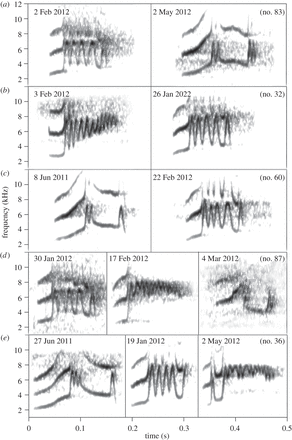Hummingbird Vocal Learning
Biology 342 Fall 2015
Alex Loukides and Hannah McConnell
Adaptive Value
Mating:
Hummingbird songs are used to attract mates. As with other clades of birds, many species of hummingbirds have males who congregate at a lek and produce their individual songs in order to attract female hummingbirds. There are other behaviors involved in mating rituals, but song production in essential for females to become interested in males as potential mates. Song are necessary for males to be able to mate, and females prefer certain songs to others. This helps to prevent inter-species matings and also may allow for variation, as not all females prefer the same type of song.
congregate at a lek and produce their individual songs in order to attract female hummingbirds. There are other behaviors involved in mating rituals, but song production in essential for females to become interested in males as potential mates. Song are necessary for males to be able to mate, and females prefer certain songs to others. This helps to prevent inter-species matings and also may allow for variation, as not all females prefer the same type of song.
Improving Reproductive Success:
There is evidence that birds with increased song repertiores have increased reproductive success. Since not all females prefer the same some type, males who are able to create variation in the songs they create are more likely to be able to mate with more females. Hummingbirds that are able to change their songs throughout their lives may have greater opportunity to pass on their genes to the next generation than those birds that cannot. There is currently no research that directly confirms this, but there are species of hummingbirds that are able to change their crystallized songs, and it has been hypothesized that this is why. While male hummingbirds never change their vocalizations as adults to the extent that they would have as juveniles practicing their "plastic songs," the amount of variation that can occur in some hummingbird's songs is far more than other avian vocal learners.
Figure 1: Songs from Long-billed Hermit Hummingbirds, the spectrogram images on the left are the early crystalized songs, and the songs on the right are the new songs created over a period of time. (Araya-Salas, M., & Wright, T. (2013). Open-ended song learning in a hummingbird. Biology Letters, 9(5).)
Urban Influence:
There is also evidence that when in urban environments, other songbirds are forced to sing at a higher pitch to combat noise pollution, which is less attractive to female birds, but the changes in song repertiore observed in hummingbirds is not the same type of variation that is seen in songbirds in noisy environments. Studies observing changes in song behavior of hummingbirds have been done in non-urban environments, and while some hummingbirds change their songs, not all do, indicating that there is no environmental pressure forcing the change in vocalization. Therefore, it seems likely that the changing of songs is an attempt to attract more mates and increase reproductive success in male hummingbirds.